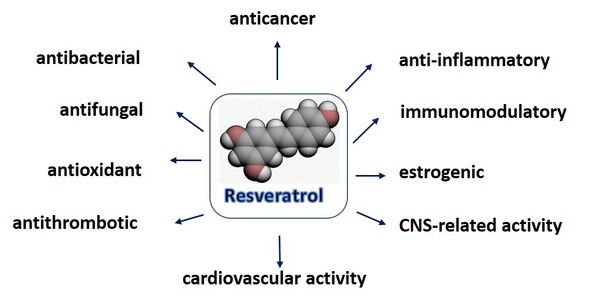In vitro Comparison of Anticancer and Immunomodulatory Activities of Resveratrol and its Oligomers
(1) Morris County Vocational School, The Academy for Biotechnology, Mountain Lakes, NJ; Mountain Lakes High School, Mountain Lakes, NJ, (2) NanoBiotec, LLC, Hanover, NJ
https://doi.org/10.59720/20-070
Stilbenoids are a group of naturally occurring phenolic compounds produced de novo in many plant species to protect against fungal infection and toxins. Resveratrol (3,4’,5-trihydroxystilbene), a stilbenoid isolated from grapes and many species of plants, is widely known for its extensive bioactivities, such as antioxidation, anti-inflammatory and anticancer effects. Recently, many novel resveratrol oligomers have been isolated from various plants. While their structures are diverse, these oligomers are characterized by the polymerization of two or more resveratrol units. Little is known regarding the bioactivities of these novel resveratrol oligomers. We hypothesized that these oligomers might have similar or superior bioactivities to resveratrol. In this study, we designed in vitro models to compare resveratrol side by side with natural dimers (ε-viniferin and gnetin H) and trimers (suffruticosol B and C) from plants for their bioactivities. Our data showed that these oligomers, similar to resveratrol, had many activities such as downregulation of cancer cell proliferation, upregulation of normal keratinocyte growth, and the modulation of the expression of pro- and anti-inflammatory cytokines in immune cells. Furthermore, these oligomers appeared to have higher cytotoxicity than resveratrol in normal human blood cells; the order was the trimers (suffruticosol B and C) > dimers (ε-viniferin and gnetin H) > monomer (resveratrol). However, only suffruticosol C, gnetin H and resveratrol showed anticancer activity against human T98G glioblastoma cells at lower concentrations. No correlation between anticancer or immunomodulating effects and the degree of polymerization was observed. Our results provide some preliminary evidences that resveratrol oligomers could be potential preventive or therapeutic agents for cancers and other immune-related diseases. As far as any superiority of efficacy of these stilbenoids is concerned, more extensive studies are definitely needed.
This article has been tagged with: